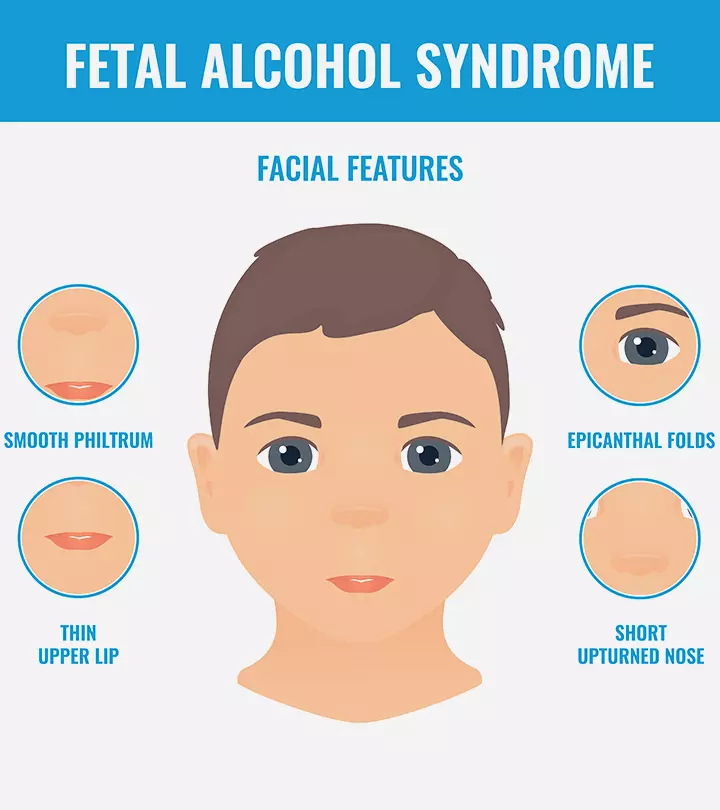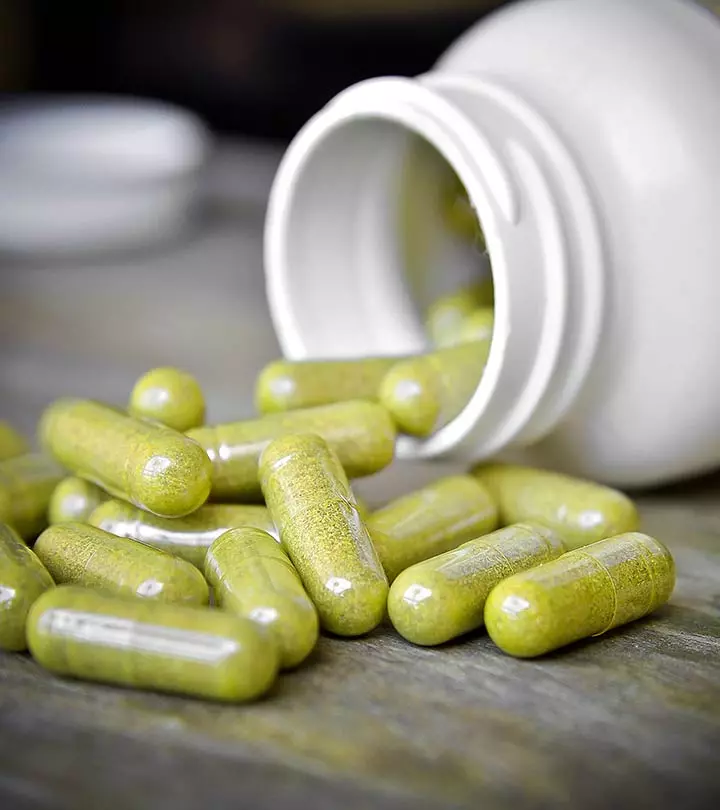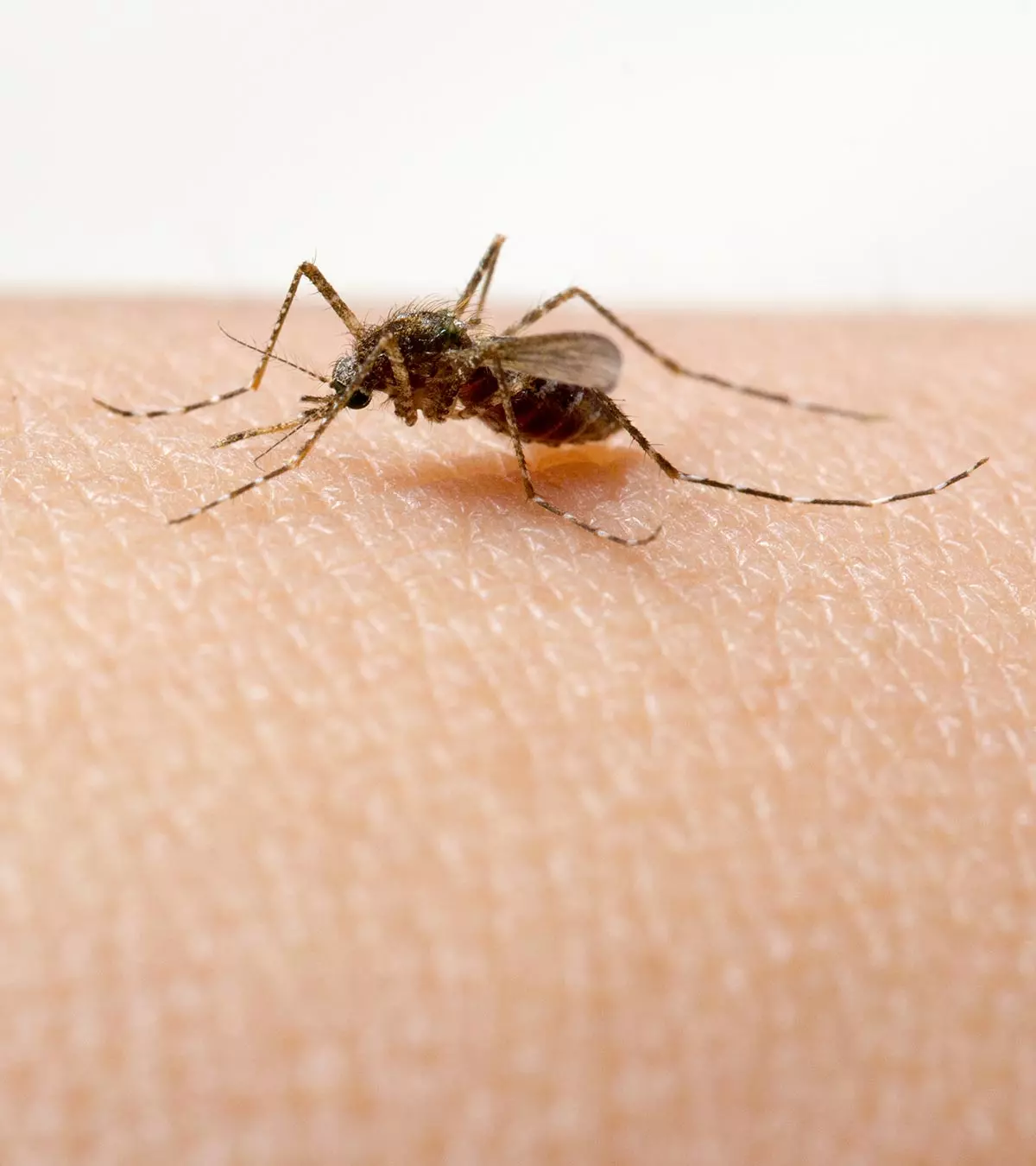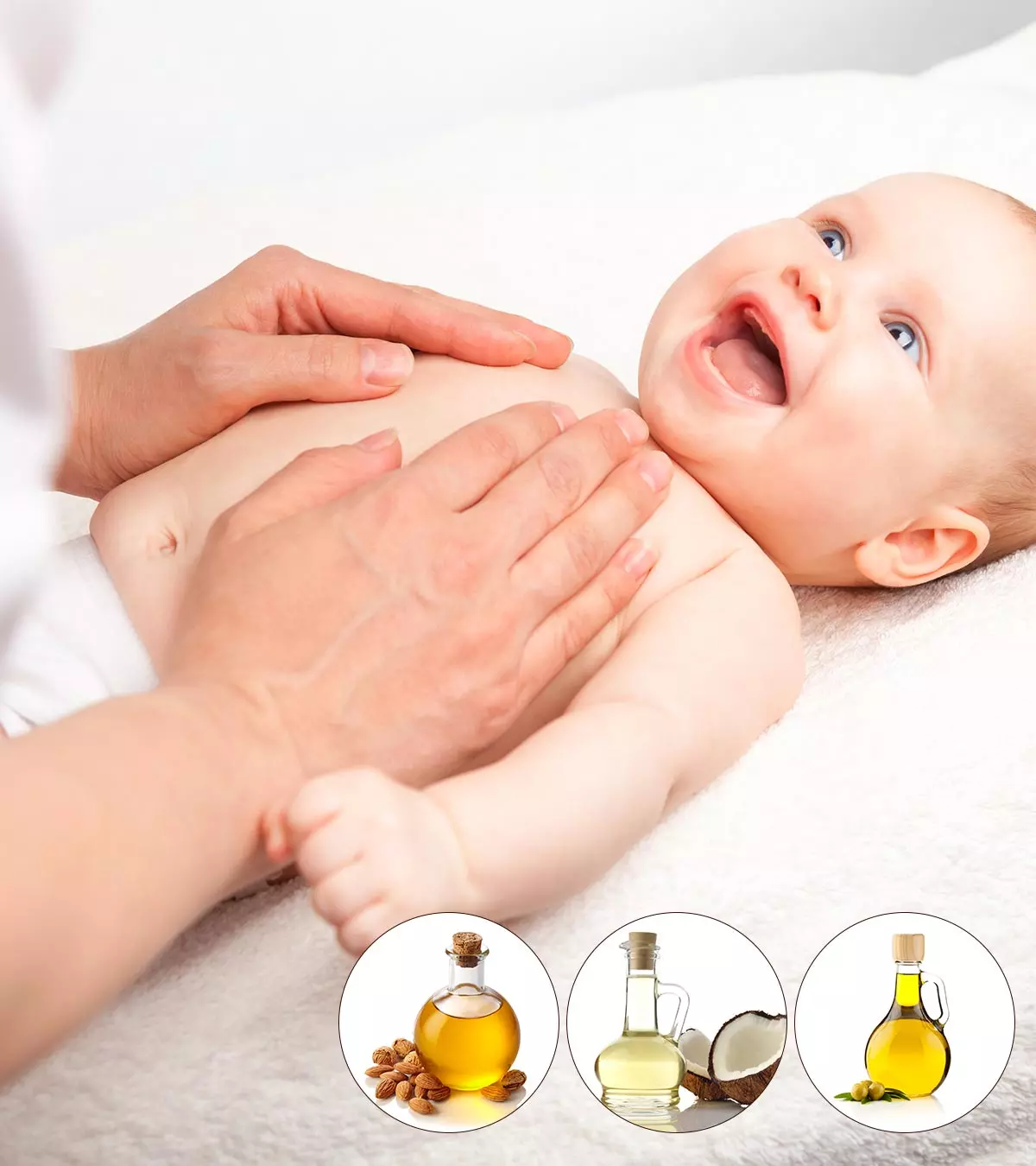
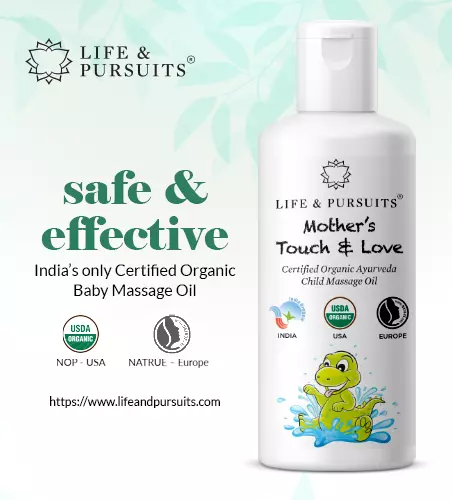
Most parents massage their babies for the first few months after birth. However, to ensure their baby gets the full benefits of the massage, they should pick the best oils for baby skin to keep their little one’s skin healthy and glowing.
Research suggests that massages are more beneficial when performed using a medium such as essential oils. In addition, massage therapy helps promote neuromotor development, emotional connection, a healthy sleep-wake pattern, and weight gain (1).
So read on to know more about massaging babies with oil, including its safety, how to select the right massage oil, and tips to keep in mind while massaging the baby.
Key Pointers
- Infant massage treatment is considered safe, but consulting a pediatrician is recommended if the infant has any underlying medical conditions.
- It is suggested that the ideal oil for infant massage should have moisturizing qualities, be non-allergenic and chemical-free, have a faint aroma, and be non-irritating.
- The optimum environment for massaging an infant includes gentle lighting, a warm temperature, and minimal noise.
- A firm stroke should be used to massage the infant’s entire body between meals, preferably 45 to 60 minutes after a meal.
- Sesame and coconut oil are two recommended massage oils for infants due to their nutrient content and skin-nourishing qualities.
Is Oil Massage Safe For Babies?
Massage therapy is considered to be a safe practice, and there are no significant harmful effects if it is performed appropriately. But if your baby has any underlying health issues, consult a pediatrician before you try oil massages for the baby. The pediatrician can help determine the safe and appropriate way to massage the baby to address their specific needs (2).
 Research finds
Research findsMeasures To Take While Selecting A Massage Oil
- The wrong selection of massage oil may cause adverse effects such as skin rashes and bacterial colonization (1). Thus, it is wise to consult a pediatrician to select an appropriate oil for your baby .
- The use of thick massage oil in hot and humid weather is not ideal, as the same may clog the pores of the skin, trapping dust and dirt.
- The baby oil should have moisturizing properties, which will start to work when it is absorbed into the baby’s skin.
- The oil should be non-allergenic and free of chemicals. So, the selection of unprocessed natural oils can be good, provided you have checked on their safety and efficacy.
- The list of natural plant oils includes both vegetable and essential oils. Essential oils cannot be used on the skin directly and need a carrier oiliPlant-based oil that dilutes the essential oils as they are highly potent . Check about this with the doctor before you try combining the essential oil with a carrier oil.
- The oil should have a mild fragrance and be free of synthetic scents that may irritate your baby’s skin.
Consider the above points to select a massage oil for your baby, and discuss in detail with your pediatrician, before purchasing one.
In addition to selecting the right kind of oil, you should also learn about how to massage the baby safely. There are no fixed guidelines describing the exact methodology of neonatal massage. However, the improper technique could be detrimental to the baby’s well-being, which makes pediatric consultation a must.
 Point to consider
Point to considerTips To Keep In Mind While Massaging Your Baby
You may have many thoughts in your mind on how to massage your baby. Here are some tips you can follow while you are all set to give the massage (2).
- Before you try any oil on your baby’s skin, just dab a little on her hand and see if it is compatible with her skin. If your baby’s skin develops any rash, then avoid using that oil.
- Establish a conducive environment before the initiation of massage. A room with soft light, warm temperatures, and low noise levels are ideal.
- Massage should be given between the feeds, ideally 45 minutes to one hour after a feed to avoid regurgitation or vomiting of the food.
- It should involve the entire body starting from the head and neck to the trunk and extremities.
- A firm stroke with fingertips should be used during massage therapy. Avoid applying too much pressure. Remove your jewelry to prevent scratching your child.
- Give a massage only when your baby is content. The comfort level of the baby is more important.
- Generally, babies sleep after the massage, so keep a check on your baby’s sleep cycle and decide to give a massage accordingly.
Next, we talk about the various massage oils you can consider using for the baby.
 Quick tip
Quick tipUses Of Massage Oil For Babies
Massage for babies has been in practice for a long time. Parents consider it to soothe their babies and foster a strong bond with the child. Yet, most of the available evidence is methodologically limited, demanding further research in the domain. However, if you want to try a massage after consulting a pediatrician, here is a list of the best massage oils for a baby.
For Normal Skin
1. Coconut oil
Topical use of coconut oil for babies is suitable during hot and humid climates. It has a light texture owing to which it gets absorbed into the skin easily during a massage. It contains nutrients, such as vitamin E, and bioactive compounds, such as polyphenols, which help nourish the skin. The oil also has antibacterial and antifungal properties that aid in treating eczemaiAn inflammation of the skin accompanied by itchiness and dryness commonly triggered by an allergen , rashes, patchy skin, dermatitisiSkin inflammation commonly characterized by itchiness and redness , and cradle capiA self-limiting scalp rash in babies characterized by white or yellow scaly patches . Two types of coconut oil – copra and virgin coconut oil – can be tried for massaging babies.
Alyssa Paxson, a mother, shares how coconut oil helped her treat her baby’s cradle cap. She says, “Coconut oil helped with his cradle cap. I’d simply rub it on his scalp a little bit before bathing him and just wash it off when I wash his hair. Slowly, his cradle cap went away (i).”
2. Sesame oil
A research study involving 125 healthy full-term infants showed that massage in infancy could improve growth and induce sleep, especially when sesame oil was used (3)
. Sesame oil has antioxidants and has anti-inflammatory, anti-bacterial, and antipyretic properties (4). Massage with sesame oil could reduce inflammation and the severity of pain. It may also help protect from the UV radiation of the sun when applied topically (5).
3. Mustard oil
Mustard oil is commonly used for cooking, but its use as a massage oil is also prevalent in some communities. Some research studies show that the use of mustard oil for massage may improve thermoregulationiThe mechanism by which the body maintains an optimum internal body temperature irrespective of the external environment , skin texture, and skin barrier function (2). Yet, recent evidence suggests that this practice may have detrimental effects, especially for preterm infants or for those whose skin barrier function is sub-optimal (6).
4. Olive oil
Olive oil is recommended for neonatal massage as it is known to improve skin hydration. Yet, olive oil contains around 55-85% of oleic acid and is considered to have the potential to disrupt the skin barrier, leading to dryness. Increased risk for atopic dermatitis has also been reported with the use of olive oil (7). So, if your baby has sensitive skin, talk to a pediatrician or dermatologist before using olive oil for massaging them.
5. Almond oil
Almond oil has emollientiRelated to chemical or natural substance that have the ability to keep skin soft and moisturized and sclerosantiA solution that is primarily responsible for the treatment of lymphatic and blood vessel disorders properties, which have been used to improve complexion and skin tone. The topical application of almond oil has also been shown to prevent the structural damage caused by UV irradiation. However, previous research on plant oils have demonstrated that almond oils applied topically, mostly remain at the surface of the skin (1).
For Sensitive Skin
If your baby’s skin is sensitive and prone to eczema or dryness, do not use vegetable oils like olive oil or high-oleic sunflower seed oil. Oils containing oleic acid make your little one’s skin more tender and drier. Instead, look for vegetable oils containing linoleic acids.
Below is a list of oils that contain high amounts of linoleic acids and are considered to be suitable for sensitive skin. However, it is wise to consult a pediatrician before you select the oil for a baby’s massage.
6. Sunflower oil
A research study has claimed that the topical application of sunflower seed oil provides protection against nosocomial (hospital) infections in preterm very low birth weight infants (2). On the contrary, another study led by The University of Manchester claimed that sunflower oil used on a healthy newborn baby is likely to damage the skin barrier exposing it to water loss and infections (8). So, talk to your pediatrician to determine whether this is good for your baby.
7. Chamomile oil
Chamomile oil is an essential oil used widely for aromatherapy, as it is known to provide therapeutic benefits. The FDA has regarded chamomile as GRAS (generally recognized as safe). Though, it is possible that some reports of allergic reactions may be due to contamination of chamomile by “dog chamomile,” a highly allergenic plant of similar appearance (9). A research study conducted on infants showed that the topical application of chamomile oil had the potential to alleviate the infantile colic symptoms.
8. Tea tree oil
This is an essential oil tested positive for its antifungal and anti-inflammatory activity in vitro on topical application (10). So it is used for babies in a few communities, although recent research presented at ENDO 2018 (the Endocrine Society meet) shows that essential oils possess a diverse amount of chemicals and should be used with caution because some of these chemicals are potential endocrine disruptors (11).
9. Calendula oil
Calendula oil can be safely used after bath as it is known to have a soothing effect on the skin. It has anti-inflammatory properties that might be effective in treating diaper rashes, inflammatory skin lesions, and other skin issues (12).
10. Castor oil
The use of castor oil for baby massage is largely anecdotal. As the consistency of the oil is thick, it is generally used as pre-bath massage oil. If you are using it, be careful not to apply the oil around the eyes and mouth. Castor oil is also used for hair growth in babies. However, it is wise to use castor oil for babies after a pediatric consultation.
 Quick fact
Quick fact11. Grapeseed oil
Grapeseed oil, also known as Vitis Vinifera, comes from grape seeds left over from making wine. It contains omega-6 fatty acids, vitamin E, and linoleic and oleic oils, which could be considered safe with no reported side effects (13). It’s said to absorb well without leaving a sticky feeling, which might be helpful for treating your baby’s dry skin (14). This makes it a good choice for babies’ delicate skin. Grapeseed oil is known for its anti-dandruff, anti-microbial, antioxidant, and anti-fungal properties (15). Additionally, using this oil on your baby’s hair and scalp might address issues like cradle cap. Applying it to your baby’s skin not only contributes to overall skin health but also possibly prevents conditions like baby eczema.
Besides the above, oils such as jojoba oil, rosehip oil, and sweet almond oil also offer numerous benefits for the skin. Alternatively, if you run out of oil, you may use pure warm shea butter to massage your baby or you can also use some fresh aloe vera gel as it is known for its hydrating property that can keep your child’s skin supple. However, use these alternatives only after seeking approval from your pediatrician.
Frequently Asked Questions
1. Which oil is the best for baby massage in the rainy season?
The best oil for babies during the rainy season may be the one that is light and nourishing and does not cause allergies. Since every baby’s skin is different, choose an oil that suits your baby.
2. Which oil is the best for babies in winter?
Since the skin tends to dry during winter, you should choose an oil that moisturizes your baby’s skin and replenishes the lost nourishment. Coconut oil and almond oil may be some good options; however, make a choice based on your baby’s skin type. Consult a doctor for further advice (16) (17).
3. Does olive oil whiten the baby’s skin?
No studies are available to indicate that olive oil whitens the skin. Moreover, skin-lightening products may have adverse effects, so it is better to stay away from them (18). If you are unsure of your baby’s massage oil, seek a doctor’s advice.
4. Can I use lavender oil on my baby?
According to Dr. James Walker, assistant professor of Clinical Medicine at LSU Health Sciences Center, New Orleans, “Lavender oil is one of the essential oils that should not be used on babies, as it may cause skin irritation, respiratory problems, and hormonal imbalances. However, some lavender-based products, such as baby shampoos and lotions containing small amounts of lavender oil, are safe. It’s always best to consult a pediatrician before using new products on a baby’s skin.”
Massage is a great technique that helps you bond with the baby. The type or technique of massage you choose could also determine the benefits that your baby derives from oil massages. Always check with your doctor before selecting oils for baby skin care, for they must be suitable for them and have no detrimental effects.
Infographic: Tips To Keep In Mind While Massaging Your Baby
Regular oil massages help strengthen your baby’s muscles and relax them. But there are certain points that you need to remember and abide by while giving a massage to a tiny tot. In the following infographic, you will find a list of points to remember. So, do give it a read and keep it handy. Illustration: Momjunction Design Team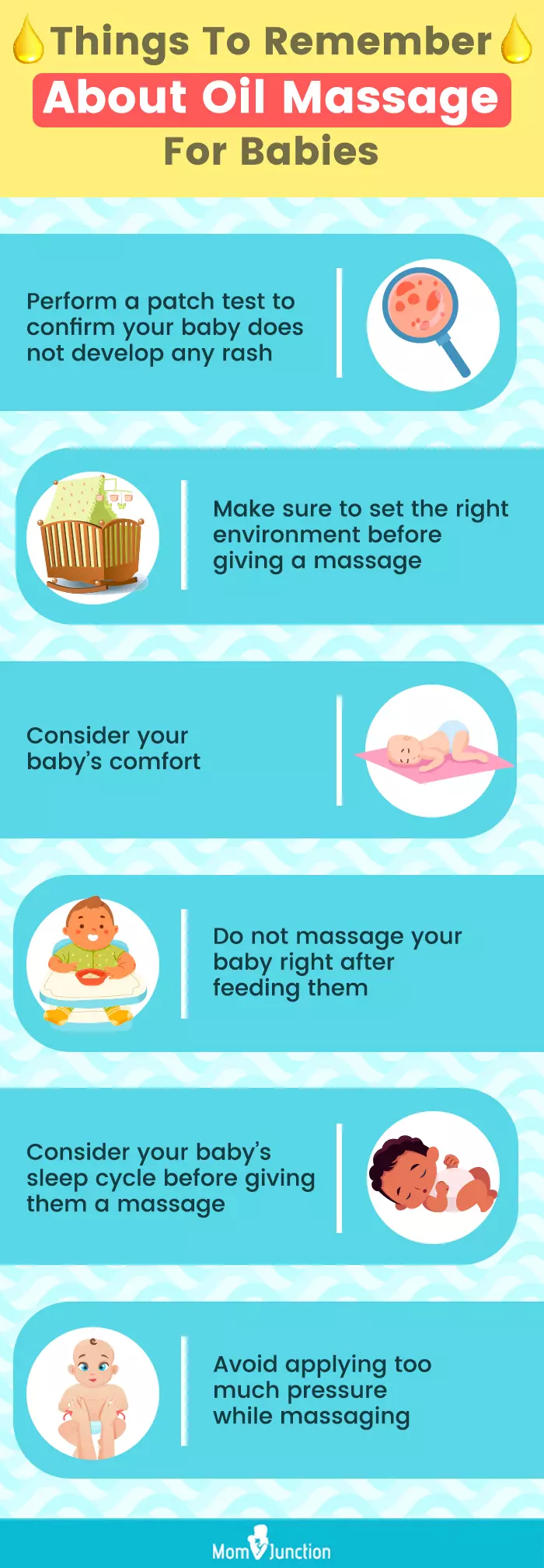
Illustration: Illustration: Top 11 Baby Massage Oils: Know What&039s Best For Your Baby
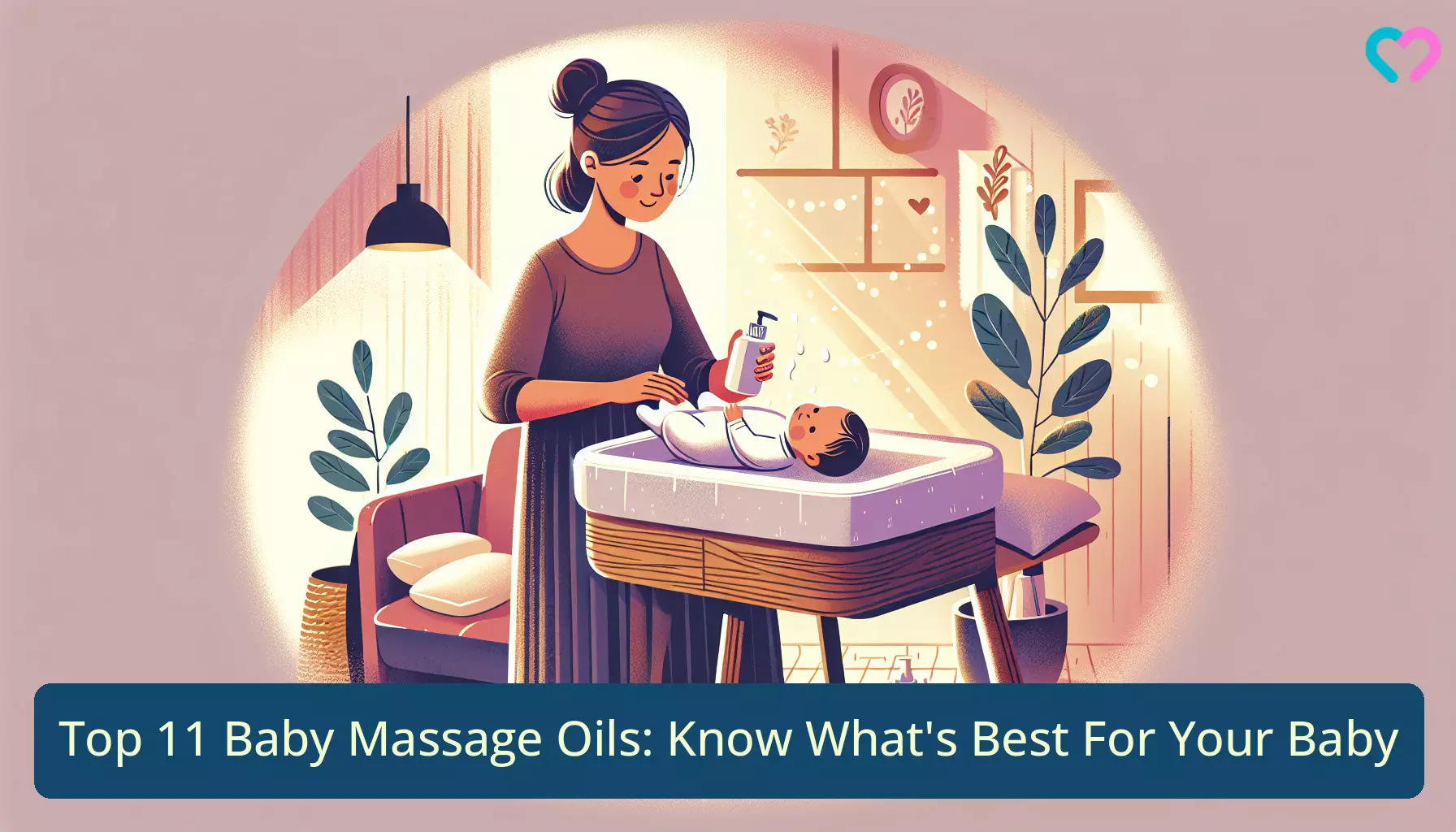
Image: Dall·E/MomJunction Design Team
Personal Experience: Source
MomJunction articles include first-hand experiences to provide you with better insights through real-life narratives. Here are the sources of personal accounts referenced in this article.
i. What I wish I’d had;https://burrowandbloom.net/2014/08/21/what-i-wish-id-had/
References
1. Sandipan Dhar et al.; Oil massage in babies: Indian perspectives; Indian Journal of Pediatric Dermatology (2013)
2. Anjali Kulkarni et al.; Massage and Touch Therapy in Neonates: The Current Evidence; Indian Academy of Pediatrics (2019)
3. Agarwal KN et al.; Effects of massage & use of oil on growth, blood flow & sleep pattern in infants.; National Center For Biotechnology Information (2000)
4. Marzieh Beigom Bigdeli Shamloo et al.; The Effects of Topical Sesame (Sesamum indicum) Oil on Pain Severity and Amount of Received Non-Steroid Anti-Inflammatory Drugs in Patients With Upper or Lower Extremities Trauma; National Center For Biotechnology Information (2015)
5. Tzu-Kai Lin et al.; Anti-Inflammatory and Skin Barrier Repair Effects of Topical Application of Some Plant Oils; National Center For Biotechnology Information (2018)
6. Luke C. Mullany et al.; Traditional Massage of Newborns in Nepal: Implications for Trials of Improved Practice; National Center For Biotechnology Information (2005)
7. Maria Livia Ognean and Mihai Ognean; The Best Vegetable Oil For Preterm Infant Massage; Research Gate (2017)
8. Olive and sunflower oil on baby skin weakens natural defences; The University of Manchester
9. Janmejai K Srivastava et al.; Chamomile: A herbal medicine of the past with bright future; National Center For Biotechnology Information (2010)
10. Babar Ali et al.; Essential oils used in aromatherapy: A systemic review; Science Direct (2015)
11. Chemicals in lavender and tea tree oil appear to be hormone disruptors; Endocrine Society (2018)
12. Assessment report on Calendula officinalis L., flos; European Medicines Society (2018)
13. Grape seed; Mount Sinai
14. Give ‘Em Some Skin; Stanford Childrens
15. Safety assessment of vitis vinifera (grape)-derived ingredients as used in cosmetics; Cosmetic Ingredient Review (2012)
16. Coconut Oil; Harvard T.H. Chan
17. Zeeshan Ahmad; The uses and properties of almond oil; NIH; 2010
18. Skin Lightening Products Found to ContainMercury, Hydroquinone and/or Steroids; Minnesota Department of Health
19. Baby massage: tips and benefits; NCT
Community Experiences
Join the conversation and become a part of our nurturing community! Share your stories, experiences, and insights to connect with fellow parents.
Read full bio of Jenni Johnson
- Dr. James Walker is a clinical doctor with over 10 years of experience managing patients. He currently works as an assistant professor of Clinical Medicine at LSU Health Sciences Center New Orleans. He did his MD from the University of Mississippi Medical Center.
 Dr. James Walker is a clinical doctor with over 10 years of experience managing patients. He currently works as an assistant professor of Clinical Medicine at LSU Health Sciences Center New Orleans. He did his MD from the University of Mississippi Medical Center.
Dr. James Walker is a clinical doctor with over 10 years of experience managing patients. He currently works as an assistant professor of Clinical Medicine at LSU Health Sciences Center New Orleans. He did his MD from the University of Mississippi Medical Center.
Read full bio of Swati Patwal
Read full bio of Rohit Garoo
Read full bio of Anindita Ghatak







